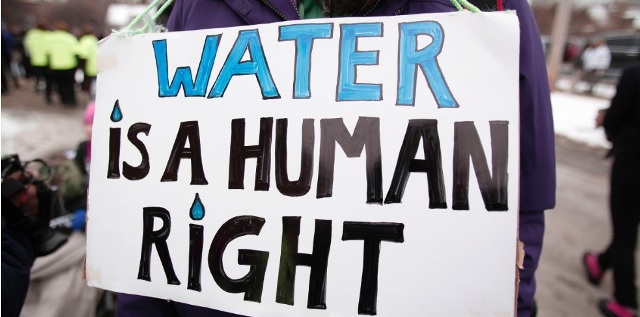Flint Not Forgotten
Many people protest in Flint, Michigan the government’s inaction regarding the amount of impure water in the town and advocate for the clean water supply in the name of human rights. Credit for the photo goes to Business Insider.
February 10, 2017
After the recent water crisis in Flint, Michigan appeared out of nowhere in the spring of 2014, a massive news story that dominated many journalistic sources, people were shocked to find out the statistics behind Flint and the government corruption, along with the horrible sanitation issues in which people lived. From pictures of children holding bottles with water as brown as mud and statistics about the amount of lead inside of Flint’s water supply, mainstream media sympathized with the small town of Flint, nearby Detroit. However, media sources as of recent months have forgotten Flint’s name, having dropped the ongoing crisis for new reports.
Flint, Michigan has had an ongoing issue regarding water impurity, with sources reporting that Flint has had issues with sanitation since as early as 2007. The most detrimental occurrence in Flint’s history was in 2014 when the water supply was changed from Lake Huron to the Flint River, which is most notorious for its lack of cleanliness. With 41 percent of the population being below the poverty line, nearly one hundred thousand people in Flint do not have access to clean drinking water, resulting in activists protesting the lack of government involvement and advocating for accessible clean water in the name of human rights. Residents of Flint, such as Melissa Mays, have taken the Flint government to court for negligence, stating that the government does not check on filters’ installation. Officials have also reported on water filters being improperly installed, resulting in worsening conditions on the water.
In November of 2016, District Court Judge David Lawson ruled that 96-liters of water will be delivered to the homes of Flint without a maintained and sufficient water filter, a victory after months of protesting governmental inaction. To reassure and confirm the governmental involvement of the crisis, Lawson also ordered that there should be an official report on the provided water by Dec. 16.
Due to many of Flint residents having ineffective water filters, citizens rely on bottled water heavily, but Lawson’s order was a relief to many and a saving act to the people of Flint.




